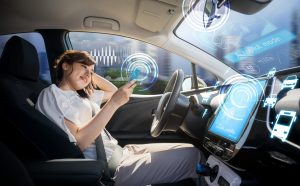Artificial intelligence (AI) is set to shape the future of virtually every industry out there, with the automotive sector among those anticipated to be most revolutionized by these technologies.
Already, AI is being leveraged at numerous stages of automotive product development and manufacturing, from R&D to post-production. Meanwhile, data-driven technologies are transforming the in-vehicle experience, with intelligent software being used to fuel a new generation of connected cars. By drawing on data and advanced algorithms to simulate and sense the way humans think, speak, and even feel, AI holds the power to elevate and tailor in-car experiences to individual drivers and passengers.
Looking forward, we can expect to see emerging AI technologies continue to be harnessed to optimize key processes in vehicle design and production, along with enhancing the everyday driving experience. Let’s dive deeper into how AI is currently being used in the automotive industry and how it’s predicted to continue paving the way for improved vehicle form and function in the coming decades.
How Auto Manufacturers Are Taking Advantage of AI
While the auto industry is still categorized as a “new adopter” of AI at this point, implementation is projected to pick up speed as companies strive to stay relevant and take advantage of AI’s myriad benefits.
Automation has long been a vital driver of advances in the automotive industry; but now, AI is setting the stage for even more rapid and drastic efficiency increases to take place. Giving machines the ability to make evidence-based predictions and react to events in real-time, AI is opening up a whole new world of boundary-breaking possibilities.
Transcending what automation tools developed in decades past could deliver, AI-powered machines are able to process and make sense of data including speech and images, pick up on patterns, and create on-the-spot solutions to problems based on past experiences in their environment.
So, what does all this mean for automotive manufacturing in particular? AI unlocks opportunities for improvement in:
Safety & Efficiency
When it comes time to build cars, AI can help manufacturers work smarter, not harder. In many of today’s automobile factories, AI-powered innovations are unlocking major advancements in safety and operational efficiency.
AI technologies can be strategically deployed for workflow optimization and vehicle safety improvements, helping manufacturers to cut costs, maximize efficiency, and raise the quality and performance of their final products.
Along with traditional assembly-line robots, automakers such as BMW are using adaptive AI robots powered by neural networks (a type of machine learning) to safely transport materials on the factory floor and build custom vehicles. These technologies pick up on background noise, vibrations, and other relevant data to forecast when maintenance will be needed for production machinery, thus warding off costly breakdowns.
Quality Control
According to McKinsey, AI-based machines can detect defects with up to 90 percent greater accuracy than humans. What’s more, the insights gleaned from AI-based quality testing can be used to identify the root causes of defects to prevent repeat design and production errors.
AI has allowed Audi to automate parts of the all-important vehicle inspection process, with machine learning software that can scan and dependably detect tiny cracks in sheet metal components like hoods and door panels, all in a matter of seconds. Recently, the company also launched a pilot project in partnership with Siemens and Amazon Web Services to test an algorithm designed to control the quality of spot welds (used to connect auto body parts) in high-volume production.
The Financial Benefits of Leveraging AI in the Auto Sector
With the developments outlined above comes what is almost certain to be explosive financial growth for automakers who wisely take advantage of AI’s vast potential.
According to research conducted by Deloitte & Tractica, the global automotive AI market is forecast to register a CAGR of 48% between 2017 and 2025, resulting in a total value of approximately 27 billion U.S. dollars by 2025.
For automotive original equipment manufacturers (OEMs), successfully scaling AI can bring an incredible return on investment. A Capgemini analysis showed that OEMs could potentially increase their operating profit by between $232 million and $764 million by implementing AI, owing to a reduction in operating costs such as logistics, labor, and maintenance.
In the near future, in-vehicle software is also slated to become more profitable. At present, around 85-90% of a vehicle’s value is generated by the hardware. But, as AI and other cutting-edge technology become ubiquitous in newly made cars, software-related technology service offerings are projected to rise to account for 40-50% of total vehicle value over the next decade.
How AI Is Improving In-Vehicle User Experience
Supported by ever-expanding computing power and industry-wide focus on state-of-the-art in-vehicle software, AI is poised to transform the ways in which we operate, interact with, and enjoy our vehicles. Let’s explore a few prominent applications that are trending now.
Boosting Convenience, Comfort, & Safety
Autonomous vehicles are one of the primary places where AI technology is already at play in today’s auto industry. More commonly known as self-driving cars, these vehicles are being designed with the intent of making vehicles safer, more efficient, and more driver-friendly.
In recent years, AI-fueled breakthroughs have begun to help advance these goals through tools like cruise control, lane and park assist, and other features in level 1 (driver-assisted) and level 2 (partially automated) autonomous vehicles.
The prospect of cars driving on partial or total autopilot may be one of the hottest topics of the moment, but it’s certainly not the only application of AI in auto that’s in the works right now. Many companies are undertaking initiatives in hopes of broadly implementing on-the-horizon technologies that aim to make cars more customized, connected, and capable of making our daily routines easier. For instance, General Motors and Volkswagen are in the process of designing seamless in-vehicle payment solutions, and Hyundai is dedicated to developing diverse biometric vehicle entry/start technologies.
As time goes on, AI is expected to become even more clever and widely applicable in the automotive sector, allowing companies that invest to make futuristic-seeming features a reality. To actualize these visions, devices and sensors connected to the Internet of Things (IoT) are increasingly being employed to support AI applications.
Before long, our vehicles may even be able to sense and respond to how we’re feeling with help from intelligent technologies. An AI model developed by MIT Media Lab startup Affectiva gains insight into the physical and mental states of drivers and passengers by measuring facial expressions, tracking eye/face movements, and monitoring voice tones. Based on this data, the software can make suggestions or decisions to promote safety and comfort. For instance, it might recommend a less congested route or a calming playlist if anyone in the car seems stressed.
Informing & Entertaining Drivers & Passengers
Another key area of opportunity for AI is to help make in-car infotainment systems more user-friendly. These systems, which simultaneously provide information and entertainment via a dashboard display, have become more popular in recent years; but so far, many have fallen short in terms of thrilling users. A Consumer Reports survey revealed that some users find their vehicle infotainment system to be distracting and difficult to navigate, particularly when essential vehicle controls like mirror adjustment are integrated into the on-screen system.
Fortunately, pivoting focus to optimizing AI-assisted speech recognition offers a promising strategy to overcome this issue. Advances are in progress to help make voice-enabled AI assistants better able to comprehend the context of human speech and recall established patterns/user preferences, thus allowing the systems to more accurately respond to and fulfill users’ requests.
In vehicles equipped with sophisticated voice-directed virtual assistants powered by AI technologies like machine learning and natural language processing, drivers will be able to simply command their car to make desired changes like adjusting the steering wheel or thermostat, rather than taking their attention off the road to complete the tasks manually. 5G technology, which is anticipated to become widespread in the next few years, is projected to improve the speed at which in-car systems process and deliver what drivers ask for.
Meanwhile, automakers like Kia and Audi are developing other innovative and immersive technologies such as augmented windshields to prevent distracted driving, improve roadway safety, and eventually double as a screen for in-car entertainment once vehicles become fully capable of handling the driving.
In early 2021, Panasonic unveiled a “heads-up” display that delivers helpful information to the driver in real-time, right in front of their eyes. Blending AI innovations with AR visuals, the system can point out cyclists and pedestrians on the display, detect collision risks, assist with route guidance by showing exactly where to turn in real-time, track driver eye movements and vehicle speed, and much more.
How Automotive Companies Are Partnering with Tech Companies to Leverage AI Technologies
Up to this point, OEMs have by and large struggled to keep pace with technology companies in terms of investment in AI technologies. However, as the pressing need to stay competitive in this arena becomes ever more apparent, many auto manufacturers are joining forces with tech providers to explore and capitalize on AI capabilities. For instance, Mercedes-Benz has partnered with Bosch on a mission to develop top-level autonomous vehicles that will totally eliminate the need for human control.
As McKinsey noted, automakers can minimize the amount of risk they assume on their AI implementation journey by partnering with established tech companies to build and integrate high-tech digital solutions. To accomplish goals like improving vehicle safety, intuitiveness, and the overall in-vehicle user experience, technology partners can help automakers unlock the power of the data that gets collected and generated once intelligent systems are implemented.
With the utilization of in-vehicle sensors and other AI-supported technologies, massive amounts of data are gathered about everything from traffic and weather conditions to the specific driver’s preferences over time. According to estimates by Morgan Stanley, the radar, cameras, and other sensors in AI-equipped autonomous vehicles may generate up to 40 terabytes of data per hour while downloading additional data needed to make instantaneous decisions and successfully navigate the streets.
If processed and stored efficiently, the data collected along the way can reveal valuable insights that can in turn be used to fine-tune AI, eventually making vehicles more responsive to their surroundings and their users’ wants and needs.
By delivering the necessary solutions to quickly and effectively collect, store, and finally analyze an abundance of real-time data, experienced data engineers and data scientists can help vehicle designers and manufacturers access key information and support the journey to producing smarter, safer, and more personalized vehicles.
High-quality data will also be crucial to enable vehicle-to-vehicle and vehicle-to-infrastructure communication, developments which will ultimately be essential to complete the progression to well-connected vehicles that are trained to detect and manage hazards while thrilling those in the cabin.
As in-vehicle systems become more elaborate and connected, protecting users’ privacy and preventing potential disasters like vehicle theft or hacking are foremost concerns. In order for emerging AI technologies like voice recognition, in-car payment, and biometric entry/start to gain users’ trust and be broadly implemented, auto manufacturers will need to ensure that privacy and data security are well accounted for in their in-car systems.
Working with experienced technology partners is a smart step toward proactive, security-minded solutions that mitigate risks. Well-developed AI-based technologies can even help to pinpoint possible cybersecurity vulnerabilities by analyzing network traffic and identifying patterns that could indicate attempted cybercrime. In fact, Forbes listed this application among the top AI developments expected for 2022.
The Road Ahead: Predictions for the Future of AI in the Automotive Industry
With AI already incorporated into many facets of automobile design and production, how much more pervasive can we expect it to become in the next decades? Here’s a glimpse at the projected progress for 2022 and beyond:
- According to an analysis conducted by FutureBridge, as of 2015, a mere 5-10% of vehicles contained some form of AI system. This figure stands in stark contrast to their latest forecast: that by the end of 2030, 95-98% of new vehicles may be equipped with AI technology.
- With the widespread adoption of AI-powered features in cars over the next decade, vehicles are expected to become associated with the software provider rather than the engine maker (as they have historically been), according to FutureBridge predictions. Falling under the umbrella of vehicle software will be everything from AI-supported autonomous driving developments to infotainment systems and more.
- Technology companies like Amazon will continue to enter and compete in the self-driving car market. Across the auto industry, collaborations/partnerships and acquisitions are expected to increase.
- Computing power is on track to keep advancing, as is algorithmic research. In turn, machines will become even better at analyzing, learning, and delivering creative solutions to complex problems for a given application, as per McKinsey insights.
Partner with Wizeline to Build a Strategic AI Roadmap for Your Business
At Wizeline, our specialists in machine learning, cloud, data science, and other AI-centric innovations help clients in diverse industries to realize the power of these technologies. For example, our design and engineering teams partnered with leading telecommunications company True Analytics to design a big data analytics tool and rapidly deliver it to market, and our Wizeliners helped a rental car enterprise upscale its data and analytics capabilities.
Our talented engineers can aid your business in capturing key data and implementing AI and machine learning tools to achieve benefits like reduced time to market and enhanced product quality. To learn more about how Wizeline delivers customized, scalable data platforms and AI tools, download our guide to AI technologies and connect with us today at consulting@wizeline.com to start the conversation.






